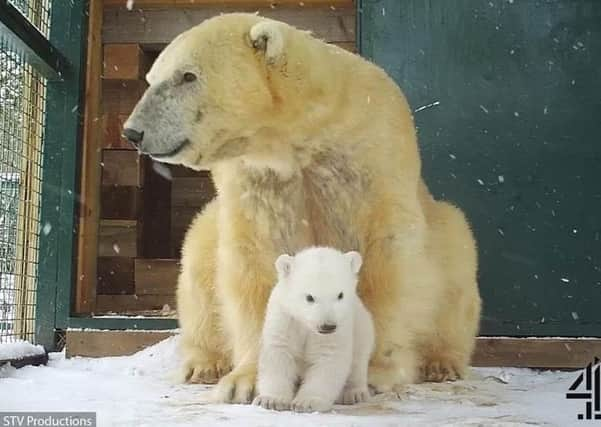First UK polar bear born in 25 years emerges at Highland Wildlife park


Previously, the birth had only been confirmed by high-pitched noises heard from the maternity den.
Now the cub’s first venture into the outside world has been caught on cameras installed by STV Productions during a two-year exclusive project to document the breeding and birth of the cub.
Advertisement
Hide AdAdvertisement
Hide AdThe cameras have been positioned outside the female polar bear’s den since early February, giving unprecedented access for a forthcoming documentary, made for Channel 4 by STV Productions, about the park’s pioneering polar bear breeding programme.
The cub was born in the week before Christmas, with mum Victoria having mated with Arktos, one of two male polar bears at the park, at Kincraig near Kingussie.
Victoria and her cub’s enclosure will remain closed to the public until late March to ensure privacy. Arktos can still be viewed in the enclosure he shares with Walker, the park’s other male.
Una Richardson, head keeper responsible for carnivores, said, “Victoria had started to come outside by herself for short periods to eat, drink and roll around in the snow, so we knew her cub would soon follow her but we couldn’t be sure when.
Advertisement
Hide AdAdvertisement
Hide Ad“I was visiting Victoria on Sunday morning to check she had fresh water and to continue slowly reintroducing food to her diet, after four months during which she lived solely off the fat reserves she built up before she entered her den.
“Suddenly I saw a small, fluffy bundle next to her and had to pinch myself to check I wasn’t seeing things. It was a very special experience and one I’ll never forget. We also have motion-sensitive cameras safely positioned near Victoria’s den and we were delighted to see we had captured her cub’s first few steps outside.
“Having only been able to hear sounds from inside the den before, we can now be certain Victoria has had one cub rather than two and we couldn’t be happier as this is the moment we have been working towards and really looking forward to.
“Both mum and cub appear to be doing well, though this is still a sensitive time and they need as much peace and quiet as possible. Our keeper activity at their enclosure will remain at a minimum for the next couple of weeks, after which visitors will be able to see Victoria and our wonderful new arrival.
Advertisement
Hide AdAdvertisement
Hide Ad“In the coming weeks we’ll also be able to find out if we have a little boy or girl and then we’ll decide on a name.”
Born blind and weighing little more than a guinea pig, the cub is now able to see and is the size of a Scottish terrier, having fed exclusively on Victoria’s fat-rich milk over the past 12 weeks.
Douglas Richardson, head of living collections at the park, said, “We are thrilled with the birth and rearing of a polar bear cub for the first time in the UK for a quarter of a century.
“The birth goes a long way to confirming that our husbandry regime works, with polar bears managed in markedly different ways to many other zoos. This includes having very large, natural enclosures and keeping the sexes in separate parts of the park, which more closely mirrors what happens in the wild.
Advertisement
Hide AdAdvertisement
Hide Ad“Some may wonder whether there is any point in breeding polar bears in zoos and the question deserves a serious answer. The change in the Arctic climate, specifically the shortening of the ice season, coupled with more direct human pressures, is having a noticeably detrimental effect on the species that is likely to result in many of the wild sub-populations disappearing.
“If we do not develop and maintain a genetically and behaviourally robust captive polar bear population, we will not have the option, should we require it, to use them to support what is likely to be a diminished and fragmented wild population in the future.”
The cub’s arrival has been welcomed by polar bear conservation charity Polar Bears International, whose executive director Krista Wright said, “We would like to congratulate Highland Wildlife Park on the successful birth of their polar bear cub.
“With polar bears facing grave threats from sea ice loss in a warming climate, it is important for facilities like Highland Wildlife Park to help educate visitors and involve them in solutions. This cub will serve as an ambassador for its wild cousins, inspiring people to care.”
The documentary on the process, Britain’s Polar Bear Cub airs on Channel 4 at 7pm on Sunday 18 March.
